Related Research Articles
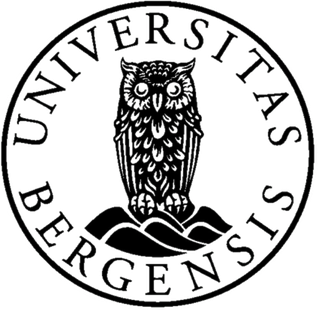
The University of Bergen is a public research university in Bergen, Norway. As of 2021, the university had over 4,000 employees and 19,000 students. It was established by an act of parliament in 1946 consolidating several scientific institutions that dated as fa back as 1825. It is Norway's second-oldest university, and is considered to be one of the nation’s four so-called "established universities." It has faculties and programmes in all the academic fields typical of a classical university, as well as such degree programmes as medicine and law that, traditionally, only the “established universities” are authorized by law to offer. It is also one of Norway's leading universities in many of the natural sciences, including marine research and climate research. It has consistently been ranked in the top 200 or top one percent of universities in the world, and as one of the best 10 or best 50 universities worldwide in some fields, such as earth and marine sciences. It is part of the Coimbra Group and of the U5 group of Norway's oldest and highest-ranked universities.
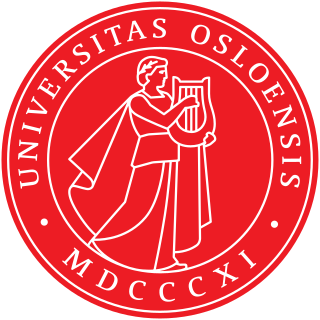
The University of Oslo is a public research university located in Oslo, Norway. It is the oldest university in Norway and consistently considered the country's leading university, one of the highest ranked universities in the Nordic countries and one of world's hundred highest ranked universities. Originally named the Royal Frederick University, the university was established in 1811 as the de facto Norwegian continuation of Denmark-Norway's common university, the University of Copenhagen, with which it shares many traditions. It was named for King Frederick VI of Denmark and Norway, and received its current name in 1939. The university was commonly nicknamed "The Royal Frederick's" before the name change, and informally also referred to simply as Universitetet.
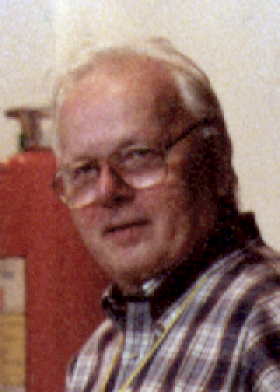
Kristen Nygaard was a Norwegian computer scientist, programming language pioneer, and politician. Internationally, Nygaard is acknowledged as the co-inventor of object-oriented programming and the programming language Simula with Ole-Johan Dahl in the 1960s. Nygaard and Dahl received the 2001 A. M. Turing Award for their contribution to computer science.
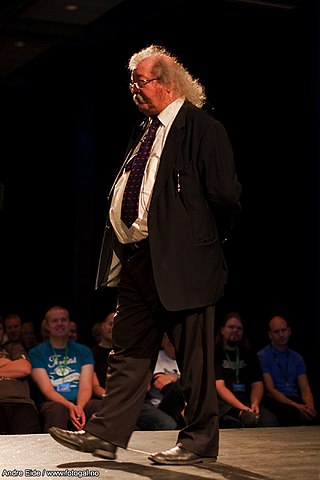
Jon Bing was a Norwegian writer and law professor at the Norwegian Research Center for Computers and Law (NRCCL), and the Faculty of Law at the University of Oslo. Bing was considered a pioneer in international IT and information law. He held honorary doctorates from the University of Stockholm and the University of Copenhagen, and was a visiting professor at Kings College, University of London. Bing was part of The Protection of Privacy Committee. From 1979 to 1981 he was head of Norsk Filmråd. Between 1981 and 1982, he was the head of The Council of Europe Committee on Legal Data Processing. Between 1993 and 2000, he headed Norsk kulturråd.
Events in the year 1930 in Norway.
Ernst Sejersted Selmer was a Norwegian mathematician, who worked in number theory, as well as a cryptologist. The Selmer group of an Abelian variety is named after him. His primary contributions to mathematics reside within the field of diophantine equations. He started working as a cryptologist during the Second World War; due to his work, Norway became a NATO superpower in the field of encryption.

Ralph Tambs Lyche was a Norwegian mathematician.
Knut Sejersted Selmer was a Norwegian legal scholar.
The Wilkes/Gleditsch trial in 1982 in Norway, concerned publication of a report by two researchers of peace and conflict studies on electronic listening stations, based on information from open sources. Putting the information together to make a complete picture was deemed to reveal a secret, according to puslespill legal doctrine, cf the website of Norway's Cabinet in 2011.

The Faculty of Law of the University of Oslo is Norway's oldest law faculty, established in 1811 as one of the four original faculties of The Royal Frederick University. Alongside the law faculties in Copenhagen, Lund and Uppsala, it is one of Scandinavia's leading institutions of legal education and research. The faculty is the highest-ranked institution of legal education in Norway and is responsible for the professional law degree, one of the most competitive programmes at any Norwegian university. Those admitted to the law programme at the University of Oslo tend to have an average high school grade that is higher than the highest grade, and are usually the best in their class at high school level.
Tidsskrift for Rettsvitenskap is a Norwegian law journal. It was established in 1888 by Francis Hagerup to "form a link between legal research in the Nordic countries" and is currently published by Universitetsforlaget. The journal is one of Scandinavia's preeminent academic journals in the field of law. It is ranked as a Level 2 journal, the highest level in the official Norwegian ranking. Articles are published in the three Scandinavian languages: Danish, Norwegian, and Swedish.
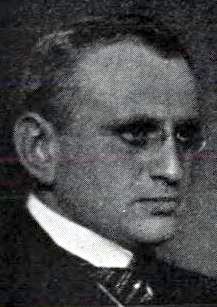
Ernst Westerlund Selmer was a Norwegian philologist and phonetician. A professor at the University of Oslo from 1937 to 1960, he was best known for his work on Low German and North Frisian.

The Norwegian Centre for Human Rights is a multidisciplinary research centre at the University of Oslo Faculty of Law. From 2001 to 2015 it was also the ICC (UN) accredited Norwegian national human rights institution.
Kristin Skjørten is a Norwegian criminologist. She is a research professor at the Norwegian Centre for Violence and Traumatic Stress Studies (NKVTS) and a professor II of the sociology of law at the University of Oslo Department of Public and International Law. Skjørten is an expert on violence and abuse in close relationships, child custody, the Convention on the Rights of the Child and children's rights.
Siri Gloppen is a Norwegian political scientist who currently serves as professor of Comparative Politics at the University of Bergen (UiB), Senior Researcher at the Chr. Michelsen Institute for Research on Development and Justice (CMI), and Director of the CMI-UiB Center on Law and Social Transformation.
Eivind Engebretsen is a Norwegian researcher in the medical humanities. He is a full professor of interdisciplinary health science at the Institute of Health and Society (HELSAM) at the University of Oslo.

Oslo Metropolitan University is a state university in Oslo and Kjeller in Norway. It is the result of the merger of many former vocational colleges in the Greater Oslo Region. It has around 1,400 academic employees, around 20,000 students and around 800 administrative support staff.
The Rosing Prizes are awarded to people who have made contributions to the Norwegian IT community, it is the Norwegian Computer Society that organizes the award ceremony. The Norwegian Computer Society was established in 1953 in Oslo and has over 8500 members, making it one of the oldest computer societies in Europe. It is also a member of the International Federation for Information Processing, the Council of European Professional Informatics Societies (CEPSIS) and the Nordic Data Union (NDU).

The Department of Informatics at the University of Oslo is the oldest and largest department for informatics in Norway. The department was in 2017 ranked number 1 in Norway, 3rd in Europe, and 12th in the world in Computer Science and Engineering by Academic Ranking of World Universities.
References
- ↑ "About the NRCCL". Archived from the original on 2007-10-29. Retrieved 2008-01-21.
- ↑ Telefon, Besøksadresse Domus MediaKarl Johans gate 47 0162 OSLO Postadresse Postboks 6706 St Olavs plass 0130 OSLO. "Senter for rettsinformatikk (SERI) - Institutt for privatrett". www.jus.uio.no.
{{cite web}}: CS1 maint: numeric names: authors list (link) - ↑ http://www.uio.no/studier/program/ictlaw-master/samlet.xml [ dead link ]
- 1 2 "Norwegian Research Center for Computers and Law - Department of Private Law". www.jus.uio.no.